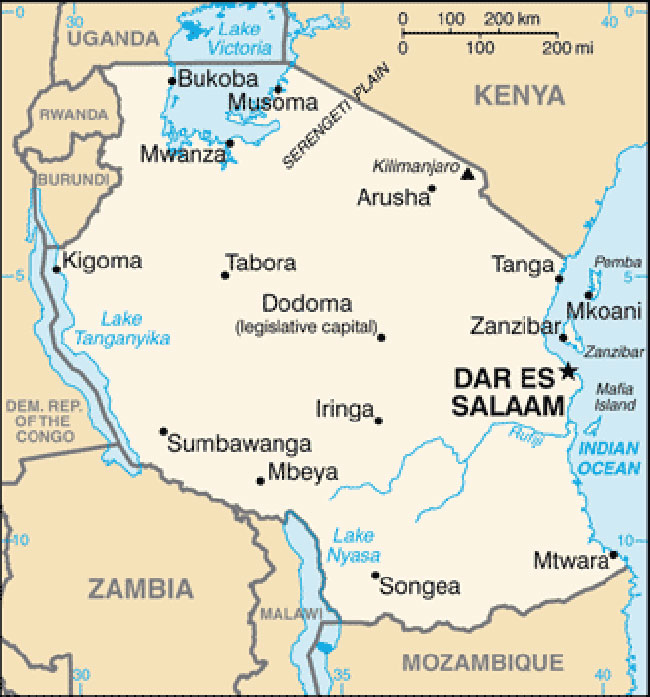YEREMIYAH MAHALU KISULA, TANZANIAN BISHOP

[Tanzania—C.I.A. Factbook. public domain]
AS A YOUTH in Tanzania [formerly Tanganyika], Yeremiyah Mahalu Kisula wanted to be a medicine man and a leader of the traditional dances. He stole and lied. But when he was sixteen, his older brother died unexpectedly. Standing at the graveside, Kisula wondered what could save him when his end came. Against his father’s wishes, he visited a church.
An evangelist asked “Who wants to believe in Jesus?” Kisula wanted to, but resisted the call with trembling. He wanted to think the matter through because accepting Christ would be defying his father and contradicting his clan which held to traditional beliefs. Furthermore, his father would forbid him to marry and refuse to pay the bride price. He decided the cost was worth it, and gave his heart to Christ the following week.
His father forbade him to attend church again. When he went anyhow, his father grabbed a heavy stick and beat him on the head until an outsider intervened. The boy moved away from home but persisted in his faith. On this day, 21 May 1921, Kisula was baptized. He had completed only the fourth grade and now reenrolled in school. A year later he entered Bible school and by the age of twenty was assisting an evangelist with the Africa Inland Mission. He persuaded his father to relax his objections and pay the bride price so that he could marry Kahibi.
Assigned to work in Bushini, he found conditions poor. When he asked to be reassigned because of his wife’s ill health, the mission refused and he resigned. He thought his education would open doors for him. Instead he had to accept back-breaking work on a distant sisal plantation. (Sisal plants are grown for their strong fibers, used in ropes, carpets, and many other products.) Eventually Kisula broke his contract, was whipped with a belt of hippo hide, and walked home through dangerous wildlands, sleeping where lions hunted. He promised God that if he would protect him, he would do whatever work God asked.
Home again, he began preaching and the local church grew. The mission restored him and sent him to evangelize on Ukerewe Island where he planted ten churches. Without consulting him, mission leaders placed some of the churches under other leaders which rankled him for years. However, they also sent him for more training. In 1938, the mission took the first steps for putting the Tanzanian work under indigenous leaders. Immediately Africans chose Kisula for a secretarial position and within five years had made him the synod’s vice chairman. Soon after that, they elected him chairman. The mission also made the Africans responsible for the financial support of their own churches, which at first meant reduced salaries for church workers.
Kisula became the first indigenous head of the Africa Inland Church of Tanzania (AICT). Fellow Africans titled him “bishop.” For many years he was tied up with administrative tasks and negotiations as the Africans made a stressful push for complete independence from the outside missions. When this was achieved, Kisula returned to his first love—preaching—with the result that he won many souls, planted churches, and extended educational and medical work. A private academy and a health college in Tanzania are named for him.
He was a deeply spiritual man, who often visited the churches under his care and prayed for the sick. A prayer-warrior and church planter, he was also an author. Search the Scriptures, his best known book, was written in Swahili. In addition to English and Swahili, he spoke three other African languages. Kahibi and Kisula produced seven children.
—Dan Graves
----- ----- -----
In Dream: Live with Purpose, Learn to Dream, you will see (among others) the true story of a Tanzanian girl bringing about change. Watch it at RedeemTV.
Dream: Live with Purpose, Learn to Dream can be purchased at Vision Video.







